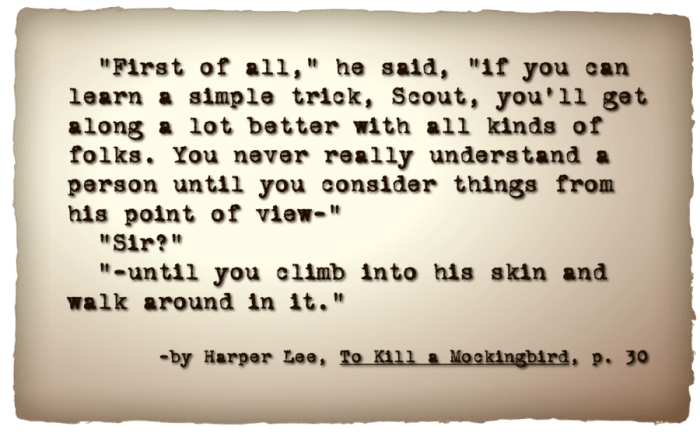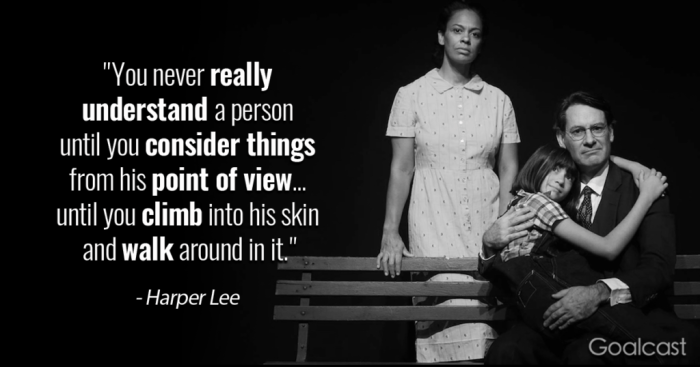To kill a mockingbird quotes with page numbers chapter 1 – In Harper Lee’s classic novel “To Kill a Mockingbird,” Chapter 1 introduces readers to the unforgettable protagonist, Scout Finch, and establishes the novel’s central themes. Through Scout’s unique perspective as a child narrator, readers witness the profound impact of empathy, prejudice, and the complexities of childhood.
Scout Finch’s Character

Scout Finch, the protagonist of To Kill a Mockingbird, is a precocious and strong-willed young girl who narrates the story from her childhood perspective. Her unique viewpoint shapes the novel, offering a child’s-eye view of the complex world of adults and the injustices that surround them.
Scout’s experiences and interactions with others contribute to her development throughout the chapter. Her encounters with her brother Jem, her father Atticus, and the mysterious Boo Radley challenge her preconceived notions and foster her understanding of the complexities of human nature.
The Importance of Empathy

Empathy plays a crucial role in Chapter 1, shaping Scout’s interactions with others and driving the novel’s central themes. Scout’s childhood experiences foster empathy and compassion within her, as she witnesses firsthand the prejudices and injustices faced by marginalized individuals.
Her empathy is particularly evident in her relationship with Boo Radley, a reclusive neighbor who is unjustly feared by the community. Scout’s willingness to see beyond the rumors and misconceptions surrounding Boo demonstrates the transformative power of empathy and understanding.
The Symbolism of the Mockingbird

The mockingbird is a potent symbol in Chapter 1, representing innocence, vulnerability, and the consequences of prejudice. The novel’s title alludes to the sin of killing a mockingbird, emphasizing the importance of protecting the innocent and voiceless.
The mockingbird’s song, a symbol of joy and freedom, is contrasted with the violence and hatred that pervades the community. By harming a mockingbird, individuals not only destroy a beautiful creature but also silence the voices of the marginalized and vulnerable.
The Setting and Atmosphere

The setting of Chapter 1, a rural Southern town during the 1930s, influences the characters’ lives and interactions. The town’s racial and social hierarchies shape the characters’ perspectives and create a tense atmosphere of prejudice and injustice.
The novel’s atmosphere is further established through the use of foreshadowing and symbolism. The Radley house, shrouded in mystery and fear, hints at the dark secrets and prejudices that lie beneath the town’s surface.
Foreshadowing and Themes: To Kill A Mockingbird Quotes With Page Numbers Chapter 1
Chapter 1 introduces instances of foreshadowing that hint at future events and themes in the novel. The mysterious Boo Radley, the tension between the Ewells and the Finches, and the racial injustice surrounding Tom Robinson’s case all foreshadow the conflicts and challenges that lie ahead.
The chapter also establishes the novel’s central themes of prejudice, justice, and childhood. Scout’s experiences with racism and inequality expose the deep-seated prejudices that divide the community. Atticus’s defense of Tom Robinson highlights the importance of justice and fairness, while Scout’s perspective as a child narrator explores the complexities of growing up in a world marred by injustice.
Question & Answer Hub
What is the significance of the mockingbird in Chapter 1?
The mockingbird symbolizes innocence, vulnerability, and the consequences of prejudice. Scout’s father, Atticus, teaches her that “it’s a sin to kill a mockingbird” because they harm no one and bring joy to others.

